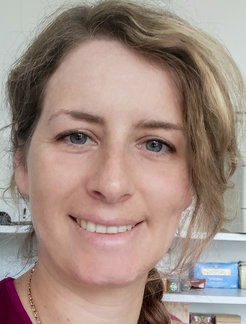Gabriella Mosca
Postdoc

- What fascinates you most about plant science?
I am a physicist and my interest for plant science started when looking for a Ph.D. position. My then future advisor asked me to read a paper from Alan Turing: I knew him as a prominent figure in mathematics and computer science and it came to me as a surprise to find out that the knowledge derived from these two fields could be used to solve fundamental questions related to biology. Later on, I became interested in how plants, which are sessile organisms and whose cells cannot move with respect to each other, unlike animal ones, can produce the astonishing variety of shapes and sizes of organs we can all witness in the real world.
- Tell us briefly what scientific questions you are pursuing at MPIPZ
I am particularly interested in how plants grow and develop into different shapes, achieving also specific functionalities, for example the exploding seeds of some common weeds we can find in our gardens. My perspective on the problem is theoretical and I am especially looking at how genetic expression concretely acts in plant cells, while at the same time I want to understand how the mechanical properties of plant cells affect the emerging shape of the growing plant organ. To answer such questions, I develop and use ad-hoc computational tools which enable integration of experimental data and theoretical hypotheses and observe whether the emerging output in the form of a growing tissue/organ is comparable with the real one.
- What/who has inspired you greatly in your career so far?
During these years I have been inspired by the many talented researches I had the chance to work with, among them my Ph.D. supervisor, Richard Smith, had a great influence in shaping my computational approach to plant science. I find the pioneering work of D’Arcy Thompson “On Growth and Form” a great source of inspiration and I recommend such reading to whoever has an interest in morphogenesis.
- What do/did you find most challenging in your career so far?
The most challenging aspect of an academic position is not connected to the science itself, but with the instability and uncertainty connected to this career. One normally changes lab, city and country several times during their academic career and even so, a final stable position is not assured. Things get even more complicated and destabilizing when being in a relationship, as for the partner and perhaps kids, relocating might be not the best choice in terms of professional and personal fulfillment.
- How do you see your future in science and why?
My goal is to establish myself as the principal investigator of a modeling group characterized by a multidisciplinary approach to developmental biology and bio-mechanics. We would on the one hand collaborate with computer scientists and mathematicians to keep developing cutting edge modeling tools, on the other hand we would collaborate with experimental biology groups to work together on a variety of problems that can benefit from bio-mechanical modeling. It is quite rare to propose to form a purely modeling lab, with no wet lab counterpart: many think a modeling lab would depend too much on experimental collaborations. But I want to challenge this vision as I think all good modern science is not a “one-man-show” but originates from collaborations.
